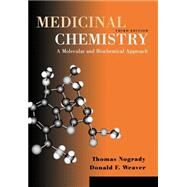- ISBN: 9780195104561 | 0195104560
- Cover: Paperback
- Copyright: 8/11/2005
Fully updated and rewritten by a basic scientist who is also a practicing physician, the third edition of this popular textbook remains comprehensive, authoritative and readable. Taking a receptor-based, target-centered approach, it presents the concepts central to the study of drug action ina logical, mechanistic way grounded on molecular and biochemical principles. Students of pharmacy, chemistry and pharmacology, as well as researchers interested in a better understanding of drug design, will find this book an invaluable resource. Starting with an overview of basicprinciples, Medicinal Chemistry examines the properties of drug molecules, the characteristics of drug receptors, and the nature of drug-receptor interactions. Then it systematically examines the various families of receptors involved in human disease and drug design. The first three classes ofreceptors are related to endogenous molecules: neurotransmitters, hormones and immunomodulators. Next, receptors associated with cellular organelles (mitochondria, cell nucleus), endogenous macromolecules (membrane proteins, cytoplasmic enzymes) and exogenous pathogens (viruses, bacteria) areexamined. Through this evaluation of receptors, all the main types of human disease and all major categories of drugs are considered. There have been many changes in the third edition, including a new chapter on the immune system. Because of their increasingly prominent role in drugdiscovery, molecular modeling techniques, high throughput screening, neuropharmacology and genetics/genomics are given much more attention. The chapter on hormonal therapies has been thoroughly updated and re-organized. Emerging enzyme targets in drug design (e.g. kinases, caspases) are discussed,and recent information on voltage-gated and ligand-gated ion channels has been incorporated. The sections on antihypertensive, antiviral, antibacterial, anti-inflammatory, antiarrhythmic, and anticancer drugs, as well as treatments for hyperlipidemia and peptic ulcer, have been substantiallyexpanded. One new feature will enhance the book's appeal to all readers: clinical-molecular interface sections that facilitate understanding of the treatment of human disease at a molecular level.







